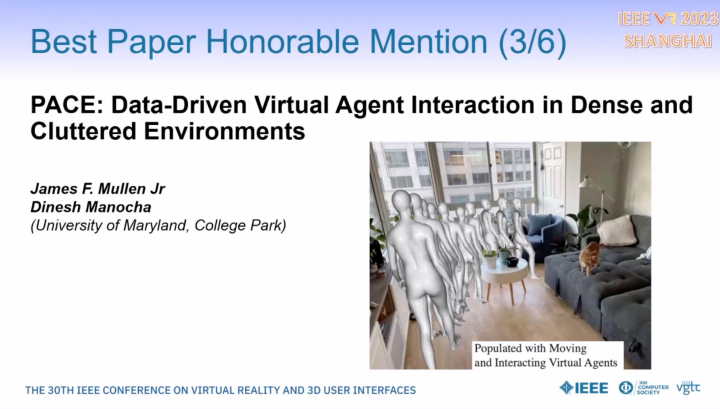UMD GAMMA Group Awarded Best Paper Honorable Mention, at 2023 IEEE VR
James Mullen, a second-year doctoral student in the Department of Computer Science at the University of Maryland, has been honored with an Honorable Mention, Best Paper award at the prestigious 2023 IEEE VR conference. The conference is globally renowned for presenting and publishing innovative research work in virtual, augmented, and mixed reality (VR/AR/XR).
Mullen's research focuses on creating realistic virtual agents that can move and interact with a 3D scene, whether it is virtual or real and crowded with objects. He uses motion-captured human data to create moving avatars that look and behave like real humans.
Mullen and Manocha's research paper, "PACE: Data-Driven Virtual Agent Interaction in Dense and Cluttered Environments," describes their method of modifying motion-captured humans to move around and interact with dense, cluttered 3D scenes while adapting to obstacles and objects in their surroundings.
“Our method modifies motion-captured humans to interact with and move throughout dense, cluttered 3D scenes. Specifically, changing a given motion sequence/animation of a human as needed to adjust to the obstacles and objects in the environment, said Mullen.
Mullen's paper was selected from 612 submissions, with only 130 accepted papers.
“James presents a novel method to add virtual agents in reconstructed or synthetic virtual worlds. This can considerably increase the sense of presence, as these virtual humans naturally interact with dense environments. This approach has considerable applications in gaming, training applications, and virtual tourism,” says Professor Manocha.
A UMD GAMMA lab member, Mullen’s research will enable the addition of extras to video games or populating virtual offices in virtual or augmented reality.
Gamma members have been consistently receiving the best paper awards and/or honorable mentions for their papers at the top conferences in virtual reality (VR) and augmented reality (AR). These accolades include awards at IEEE VR 2022, IEEE ISMAR 2021, IEEE VR Conference 2021, and IEEE VR Journal Track 2021.
-----------------------------------------------------------------------------------------------------------------------------------------------
This research work is based upon work supported by the National Science Foundation Graduate Research Fellowship Program under Grant No. DGE 1840340. It is also supported by ARO Grant W911NF2110026 and U.S. Army Cooperative Agreement W911NF2120076. Any opinions, findings, and conclusions, or recommendations expressed in this study are those of the author(s) and do not necessarily reflect the views of the National Science Foundation.
The Department welcomes comments, suggestions and corrections. Send email to editor [-at-] cs [dot] umd [dot] edu.
